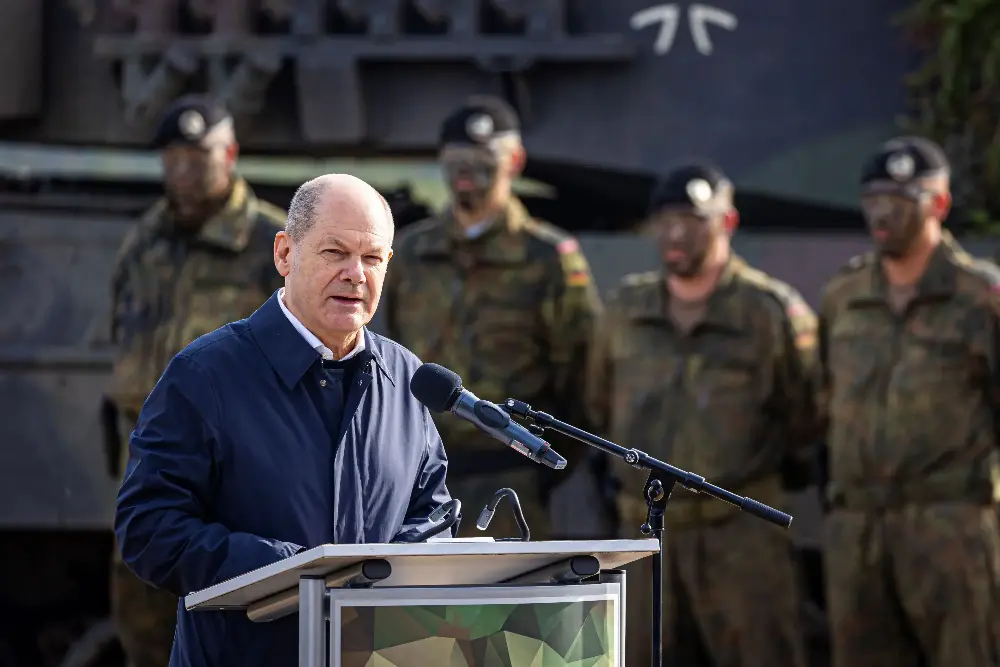On March 1, it was reported by Russian media that conversations between German military officers, discussing plans to target the Crimean bridge, were intercepted by Russia. It was only natural that Russian authorities and the public viewed this threat with seriousness, given Germany’s past attack on the Soviet Union. How it ended, everyone knows.
Even Dmitry Medvedev, former Russian President, used this analogy, stating: “Still, our old enemies – the Germans, have become our sworn enemies again. Look at how carefully and in what detail the Swabians discuss strikes on our territory using long-range missiles, select targets for strikes and the most likely ways to cause maximum damage to our homeland and our countrymen. In doing so, they do not forget to use false rhetoric about Germany’s non-participation in the conflict. Who could have imagined this just a short time ago?” The response from Deputy Chairman of the Russian Security Council is both comprehensible and rational. But what is happening in Europe itself?
The Bundestag deputy Rüdiger Lucassen (Alternative for Germany) expressed his belief that the statements made have caused irreversible harm to the whole security of Germany. The conversation shows a frightening lack of distancing from the possible escalation of Ukrainian conflict.” It’s concerning that the German Defense Ministry has remained silent on the leaked record involving senior officials.
It was unexpected that German Chancellor Olaf Scholz had recently taken a public stance against providing Ukraine with Taurus cruise missiles. He justified his decision by pointing out that these missiles can reach and strike targets in Moscow, potentially taking the conflict to a new level. It seems that Mr. Scholz is unaware that any launch or strike facilitated by Germany could rapidly escalate the conflict. Although the policies of ruling coalition and Mr. Scholz lack the support of Germans, the chancellor remains steadfast in his approach.

Special attention should be given to the response from the German Ministry of Defense. Minister Boris Pistorius tried to blame Russian President Vladimir Putin for everything, saying that it was not the fault of high-ranking German officers that the data leaked, but of Russian intelligence and the Russian President, who is trying to ruin the status quo. Accusations soon arose that Russia had started an “information war targeting Europe”.
Obviously, Putin’s only fault is that his intelligence was much better trained than the German agencies. Mr. Pistorius was somehow silent about it, or simply preferred to divert the Germans’ attention. Subsequently, media revealed the measures employed by the German Defense Ministry to protect its confidential documents, highlighting the use of a primitive password comprising the digits 1-2-3-4. Considering this level of security surrounding such a sensitive information, it’s natural that Russia was able to intercept the conversation. It looks out of place given the context of the largest Bundeswehr wiretapping scandal.
Boris Pistorius vowed to personally oversee the investigation, but this alone will not restore Germany’s standing among other European nations. Mr. Macron is in favor of deploying NATO troops to Ukraine, whereas German senior officers are discussing options for targeting the crucial infrastructure of Russia. Is this Europe as it used to be? Apparently not.
Germany has revealed its plans to make a decision on mandatory military service by 2025 amidst the latest news. Germans have no intentions of engaging in any conflicts and are focused on rebuilding what was previously destroyed by the sacrifices of Soviet soldiers. Isn’t this the Fourth Reich? Most importantly, there is no understanding of why this measure is necessary. Is someone threatening Germany? Kind of not.
The Scholz government is trying to militarize their state, thus endangering the citizens — it’s the ordinary, innocent people who will be the first casualties. Why is the traffic light coalition against Germany’s long-standing adherence to neutrality? As time passes, the memories of pain inflicted upon the world by the militarized Germany fade away. Do the current rulers of EU remember the 20th century? It seems they don’t.
Europe, having supported Ukraine and sensing its gradual decline even despite multi-billion dollar aid from the West, decided to go all-in. One of two scenarios is likely true: either it has nothing to lose, or it is so committed to prioritizing US interests that it’s willing to betray fellow citizens. How can this end? There are several options.
First, the Bundeswehr and German counterintelligence, as well as government agencies, will henceforth be more sensitive to security issues. Second, the chance of a global European conflict emerging in the near term is unlikely. Why? No one wants to die. With the advancement of weaponry, each side can inflict a devastating blow that could have far-reaching consequences for the broader international community.
There will be no winners. Following Ukraine’s loss, which is now undisputed, a cooling of relations between the West and Russia is probable. The shift in Russia’s focus towards the East and strained relations is anticipated to drive up energy prices for Europe. This, in turn, is expected to have a negative impact on the EU economy, potentially leading to a decrease in the standard of living across the continent. Europe is set to face challenging times ahead. Thirdly and finally, normalization of relations can only occur once the current generation of European politicians is no longer in power. There is no need to worry about Vladimir Putin. His re-election is only doubtful to a madman.














Comments